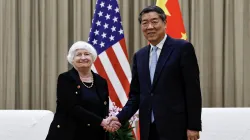US, China agree to launch exchanges on balanced growth; Washington flags Beijing's 'overcapacity'
US Treasury Secretary Janet Yellen's priority in China has been to persuade Chinese officials to rein in excess production capacity for e-vehicles and solar panels. Worried that it will flood their markets with low-priced exports, the US has made efforts to reduce dependence on Chinese technology.

Guangzhou: The United States and China have agreed to launch exchanges on balanced growth in domestic and global economies, along with a forum to cooperate on anti-money laundering forums, at a meeting between US Treasury Secretary Janet Yellen and Chinese Vice Premier He Lifeng in Guangzhou on Saturday. Yellen said the effort was partly aimed at US concerns about China's excess manufacturing capacity.
The exchanges "will facilitate a discussion around macroeconomic imbalances, including their connection to overcapacity, and I intend to use the opportunity to advocate for a level playing field for American workers and firms," Yellen said in a statement released at the conclusion of the two-day talks. She characterised the talks as frank and productive.
The Secretary's top priority after arriving in China on Thursday was to persuade Chinese officials to reduce excess production capacity for electric vehicles, solar panels and other clean energy technologies that are threatening competing firms in the US and other countries. Chinese state media pushed back on her excess capacity arguments, calling them a "pretext" for protectionist US policies.
What did Yellen say about China's overcapacity?
Yellen, He Lifeng and their teams held over four and a half hours worth of meetings on Saturday on a range of economic topics, including the US concerns on China's 'overcapacity'. The US Treasury Secretary told businesspeople in Guangzhou that concerns are growing over the global economic fallout from China's excess manufacturing capacity, making the issue the focus of her four days of meetings with Chinese officials.
Citing China's overproduction of electric vehicles, solar panels, semiconductors and other goods that are flooding into global markets in the face of a demand slump in China's domestic market, Yellen said this was not healthy for China and was hurting producers in other countries.
Notably, Chinese government subsidies and other policy support have encouraged solar panel and EV makers in China to invest in factories, building far more production capacity than the domestic market can absorb. The massive scale of production has driven down costs and ignited price wars for green technologies, a boon for consumers and efforts to reduce global dependence on fossil fuels.
As such, Western countries are worried that the overcapacity will flood their markets with low-priced exports, threatening American and European jobs. This has prompted the US to reduce dependence on Chinese technology to build its domestic manufacturing capabilities, a move many in the White House and Congress see as important to maintaining national security.
China criticises US stance on excess manufacturing capacity
Chinese state-controlled Xinhua news agency dismissed US concerns about excess capacity as a pretext for tariffs and "rolling out more protectionist policies to shield US companies", while also noting that Yellen's visit to China is a "good sign" that the world's two largest economies are maintaining communication amid strained relations over several issues.
Such comments seek to undermine China's domestic growth and international cooperation, and Washington should focus on fostering innovation and competitiveness within its own borders instead of resorting to "fear-mongering," Xinhua said in an editorial on Friday. "After all, it is now known by the world that Washington will not hesitate to show its protectionist teeth under the guise of national security in areas where its supremacy is challenged," it added.
Meanwhile, Yellen will travel later on Saturday to Beijing, where she will meet officials including Premier Li Qiang, Finance Minister Lan Foan and People's Bank of China Governor Pan Gongsheng through Monday, according to a Treasury press advisory.
(with inputs from Reuters, AP)
ALSO READ | 'Not dictating...': US officials say they haven't asked India to reduce purchase of Russian oil